The sari-sari store is a cornerstone of Filipino communities, providing essential goods to locals in a convenient and accessible manner. While traditional, these small neighborhood stores have the potential to harness the power of emerging technologies like Artificial General Intelligence (AGI) to revolutionize their operations and significantly increase profits. Here’s how AGI can be a game-changer for sari-sari stores.
1. Inventory Management and Optimization
AGI can predict sales patterns by analyzing historical data, local events, and even weather forecasts. By accurately forecasting which products will sell and when, store owners can maintain optimal inventory levels, reducing waste and preventing stockouts. AGI can also suggest new products based on trends in the local or national market.
Example: An AGI-powered system can alert the owner to stock up on soft drinks and snacks during summer months or before a local fiesta, ensuring high-demand items are always available.
2. Dynamic Pricing for Maximum Profit
AGI systems can implement dynamic pricing strategies by analyzing local supply and demand, competitor pricing, and purchasing trends. For example, prices can be adjusted slightly higher during peak demand periods or promotional pricing can be applied to clear slow-moving inventory.
Example: If AGI detects that a nearby convenience store has run out of a popular item, the sari-sari store can temporarily adjust its pricing for that item to capitalize on increased demand.
3. Personalized Marketing and Customer Engagement
With AGI, sari-sari stores can create personalized marketing campaigns tailored to their regular customers. By analyzing purchasing behaviors, AGI can recommend promotions, discounts, or bundled offers that resonate with specific customers.
Example: If a regular customer frequently buys canned goods, the store can offer discounts on complementary items, such as rice or condiments, to encourage more purchases.
4. Automating Routine Tasks
AGI can automate tasks like bookkeeping, sales tracking, and expense monitoring, saving time for the store owner. It can generate real-time reports, helping owners make data-driven decisions quickly and efficiently.
Example: Instead of manually recording sales, AGI can automatically categorize transactions, calculate daily profits, and even forecast future earnings.
5. Enhancing Customer Experience
AGI-powered chatbots or digital assistants can be integrated into sari-sari stores. These tools can answer customer inquiries, provide product recommendations, and handle orders through messaging apps like Facebook Messenger or WhatsApp, which are popular in the Philippines.
Example: A chatbot can inform customers about the availability of products or special promotions, allowing them to reserve items for pick-up.
6. Digital Payment Integration
By integrating AGI with digital payment systems, sari-sari stores can offer cashless payment options. AGI can manage transaction records, detect fraudulent activities, and analyze payment data to improve financial management.
Example: AGI can recommend adopting GCash or PayMaya for cashless transactions, increasing convenience for tech-savvy customers and promoting higher spending.
7. Community Insights and Market Expansion
AGI can analyze data about the local community’s preferences, economic conditions, and purchasing power. This insight helps the sari-sari store expand its product range or even partner with larger suppliers to offer exclusive deals.
Example: If AGI notices a growing interest in eco-friendly products, the store can stock reusable containers, bamboo straws, or organic snacks to cater to this demand.
8. Streamlining Supply Chain Management
AGI can optimize the store’s supply chain by identifying the most reliable and cost-effective suppliers. It can even predict when and where price fluctuations will occur, allowing the store to procure goods at the best possible rates.
Example: AGI can recommend placing bulk orders during off-peak seasons to benefit from supplier discounts.
Challenges to Consider
While AGI offers significant advantages, implementing it in a sari-sari store comes with challenges:
- Cost: The initial investment in AGI tools and technologies may be high for small store owners.
- Training: Owners and staff may require training to effectively use AGI systems.
- Internet Connectivity: Many rural areas lack reliable internet access, which can hinder AGI implementation.
Overcoming Barriers
Governments, NGOs, and private companies can assist sari-sari stores by offering subsidized AGI solutions, training programs, and internet connectivity enhancements. Community initiatives could focus on creating shared AGI platforms specifically designed for small businesses.
The Future of Sari-Sari Stores with AGI
By adopting AGI, sari-sari stores can transition from being traditional neighborhood shops to data-driven, customer-focused enterprises. This integration has the potential to boost profitability, improve operational efficiency, and create a more satisfying experience for customers. As AGI technology becomes more accessible, it offers an exciting opportunity for sari-sari store owners to thrive in a rapidly evolving market.
[SEO optimized]


